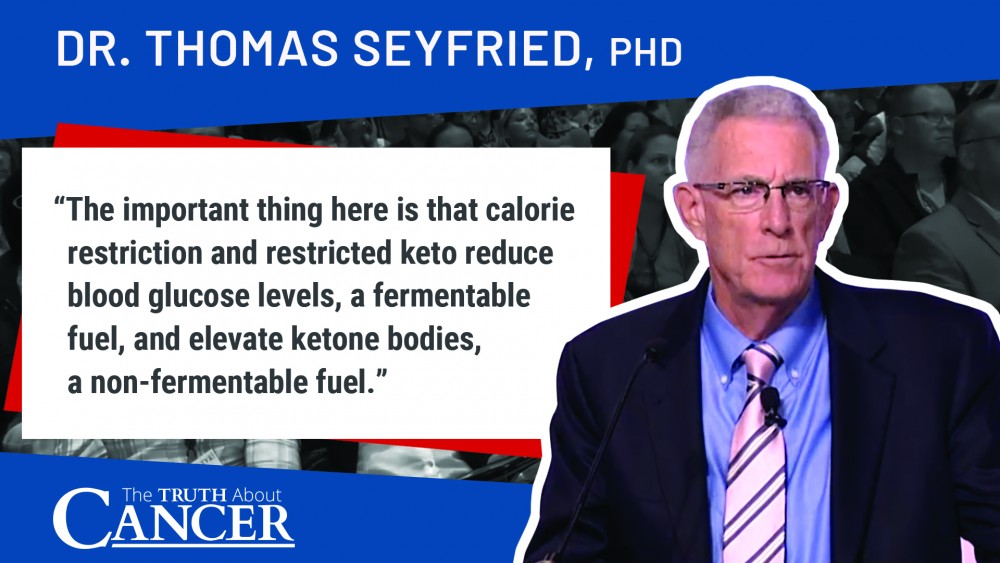Video Transcript: How Fasting & the Keto Diet Actually Fight Cancer
Ty Bollinger: As you might know, the ketogenic diet is a very popular topic here at The Truth About Cancer. It is a great diet to fight inflammation in your body, if done correctly.
Charlene Bollinger: Dr. Thomas Seyfried, who’s a specialist on this topic, talks more in this short video about how fasting and the keto diet may help fight cancer. Take out your pencils & notebooks and listen carefully – you’ll want to take notes!
Dr. Thomas Seyfried: So, we have here normal epithelial cells. Now, these cells can get damaged from any one of the oncogenic paradox issues, they start to proliferate, they start to increase in the microenvironment. Cells of our immune system now come in because they see this as a wound. They have wound healing capabilities.
The macrophages throw out growth factors and cytokines to put the wound out, but in so doing it makes these blue cells grow even faster.
So, our own bodies have a counteractive–we’re fighting against each other. They’re doing an inappropriate thing, but they’re programmed to do that. These cells will actually fuse with some of the cells to help put out the fire, these macrophages, and in so doing they dilute their normal mitochondria in the cytoplasm.
Now, these macrophages now become corrupted. These are the most powerful cells in our body, they evolved to kill bacteria and keep us healthy from the environment. This is like the police department and the militia being corrupted in your own society. Bad problem, rogue macrophages.
They’re programmed to enter and exit the circulatory system; they’re programmed to shut down immune responses; these are a tough cell to kill. They live in hypoxic environments, making them very difficult to kill, and they love glutamine. They love glutamine, so you have to know that.
So, if most cancer cells obtain energy through fermentation, what can we do? One strategy is try to reduce fermentable fuels and give them non-fermentable fuels. So, what we do is we use calorie-restricted ketogenic diets, therapeutic fasting, and this kind of thing that we’ve heard about today.
So here are a number of things about calorie restriction. The important thing here is that calorie restriction and restricted keto reduce blood glucose levels, a fermentable fuel, and elevate ketone bodies, a non-fermentable fuel. So, what we’re trying to do is just simply take away the driving fuel that makes the beast go, and giving it something that it can’t use.
And also this enhances the mitochondria; in normal mitochondria, it starts to make them healthier. But I want to show you calorie restriction (CR) in a mouse. But CR in the mouse equates water-only therapeutic fasting, and we heard that from Dr. Group this morning, which was very interesting. So, when I talk about calorie restriction in mice, if you want to get the same effect you have to stop eating and just drink water, alright?
Now we use ketogenic diets. “Oh this is a big mystery, follow this diet, that diet, Atkins diet,” you know. It’s a very low carb diet, but the carbs, the proteins, and the fats all play a very important role in ketogenic, that’s not all the same. There are many different forms of ketogenic diets.
Important thing, don’t eat too much of this. If you eat too much, you’ll get insensitivity, make the tumor grow faster. You have to—food is medicine. If you don’t know how to use the medicine you could harm yourself. You need people that know how to do this stuff.
So, the goal here is that if you want to manage it, at least the first step in trying to manage the disease, is we’ve got to lower the blood sugar, and we’ve got to elevate the non-fermentable ketones, and then we can slow this guy down. I’m not saying we cure him or we resolve, I just say we slow it down because if we can slow it down we can make them vulnerable to other forms of attack, and I’ll show you about that.
So, this is one of the first reports that got our attention, by Linda Nebeling at Case Western Reserve. She took two little girls, hopeless cases, brutalized, brutalized by the system. Surgery, radiation, chemo, the poor little kids lost their—so she put them on this ketogenic diet and was able to keep one kid alive for two more years. They were supposed to be dead very quickly, read the original paper.
And one of the kids was lost to follow-up. This is the only study done in pediatric oncology, that I know about, where they actually got tremendous results. They don’t do it. We do it in epilepsy all the time, treating little kids with ketogenic diets, but not in pediatric oncology. It’s a tragedy in my viewpoint.
Now, because of Linda’s paper, we got very excited. So, we decided to say, “How are we going to be able to do this?” So, we just take these mice, put glioblastoma or astrocytoma cells into their brain, and then we waited a couple of days and then we gave them calorie restriction. 40% calorie restriction is like water-only therapeutic fasting.
And you can see this large tumor on the guy, this is standard diet unrestricted, which is a high carbohydrate diet, high carbs. And this is the same diet, just restricted 40%, and we get anywhere from a 65 to 85% reduction in the size of the tumor.
Each square here is a mouse under a different dietary condition. So as glucose goes down, ketones go up. This is an evolutionarily conserved adaptation to what happens when we stop eating. Ketones go up because the brain has to have an energy if you’re taking away the glucose. As glucose goes down the size of the tumor goes down.
This was our work in the mouse, it has since been replicated in human glioblastoma, human breast cancer, colon cancer, all these different cancers. The higher your sugar, the faster the tumor grows, the lower the sugar the slower the tumor grows. Why is that so hard for anyone to understand? Why in oncology clinics, you give cake and ice cream to the kids? It’s clear, it’s been replicated over and over again.
Charlene Bollinger: Wow, that’s great information about the ketogenic diet.
Ty Bollinger: Yeah, the ketogenic diet is not a fad. It’s a diet that’s based on science. And I think Dr. Thomas Seyfried enlightened us a little bit about that science. It goes way back. The original ketogenic diet, as you might have heard about, was called the Atkins diet.
But it’s not the keto diet. Because the keto diet is really focused on high quality fats and moderate proteins. But you heard all of that from Dr. Seyfried just now. It’s a great explanation. It is a scientifically-formulated diet and we know the research shows that it can help to remove the fuel from cancer fuels which feed on what honey
Charlene Bollinger: Sugar.
Ty Bollinger: Sugar. Cancer feeds on sugar. Great information. If you remove the fuel from cancer cells, they don’t do very well. So, thank you Dr. Seyfried again.
Charlene Bollinger: Yes, thank you. Thank you out there for watching. Until next time, God Bless.



















What about cancers with the BRAF mutation? Studies coming out that these types of cancer tumors will grow faster .One of the alternative energy sources produced by ketogenesis is acetoacetate And they say this accelerated growth in BRAF positive cancers. I would love to hear your thoughts on this as I have BRAF positive thyroid cancer and have been on this for 2 weeks now and feel amazing!!
Hi, could something like fermented greek yoghurt to prevent leaky gut be also be good to help prevent cancer?
Why not take glutamine to help the side effects of chemotherapy. Possible Microsoft’s I.e. of the mouth or throat. Or peripheral neuropathy. I get mixed information.
I am on chemotherapy treatment now.
I have a problem with the keto diet in relation to cancer. There has been a lot of proof of the links between animal products and dairy, and cancer, and they promote eating both. That’s where a lot of the fat comes from on their diet. I know there are a few people doing a combination of plant based which is what I do, and keto, but I’m not having a lot of luck in getting much info on that. Having a hard time trying to figure out how you could get enough good fat without animal products and dairy. Plus, a lot of the keto foods are packaged which means they processed to some extent, which is not good.
Good question, and I’ll tell you what I’m doing, for what it’s worth. I do eat some animal products, but no dairy.
On the plant side, my fat comes from coconut oil, coconut milk, coconut cream, coconut butter, olives, some olive oil, avocados, avocado oil mayonnaise, MCT oil derived from coconuts (Brain Octane), nuts … primarily macadamia nuts and pecans, almond flour, and seeds. shelled hemp seeds, flax, pumpkin, chia. I also get some from sunflower lecithin and dark chocolate. That’s a lot of sources.
On the animal side, the majority comes from Alaskan red salmon and sardines, pasture raised eggs, some other well raised meats in small quantities, and krill oil. Should I be cutting ot animal products entirely? many believe so. Others say it’s not necessary as long as the food has been properly raised and processed and you don’t eat too much. Too much protein is clearly a growth promoter, and that’s not a good thing. But I figure … rightly or wrongly … that if you’re not eating enough for the liver to convert that protein to glucose via gluconeogenesis … and in the process bump you out of ketosis, you probably aren’t eating enough to signal the body it’s time to go into growth mode vs. fat burning and repair mode.
Hope this helps.
I do think a lot of people will default to dairy and meat to get the fat, just as they defaulted to eating mostly protein when following Atkins. But you certainly don’t have to. The plant kingdom offers plenty of great sources of good fats.
Walnuts, Almonds, and all nuts are high in healthy fats and vitamin E. Do your homework, you will be surprised.
I recently purchased a great cook book called ” keto-tarian.”
Mostly plant based plan by Dr Will Cole….you should check it out.